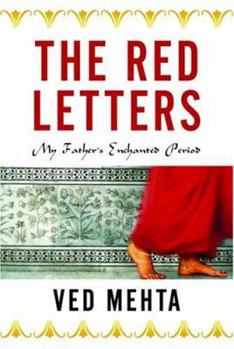The Red Letters: My Father's Enchanted Period
The story has its origins in the sixties, when Mehta by chance finds his father weeping uncontrollably on his mother's shoulder during a New York dinner party. As a result, the son begins to unravel a... This description may be from another edition of this product.
Format:Hardcover
Language:English
ISBN:1560256281
ISBN13:9781560256281
Release Date:September 2004
Publisher:Nation Books
Length:190 Pages
Weight:0.85 lbs.
Dimensions:0.9" x 5.9" x 8.4"
Customer Reviews
2 ratings
Yet another wonderful book by Ved Mehta
Published by Thriftbooks.com User , 19 years ago
Warning: If The Red Letters is your first Ved Mehta book, it is only the beginning. Reading a book by Mehta is like trying to eat just one bite of Swiss chocolate. It's not enough. You'll have to read another, and then another, till they're all read. And by the way, don't be surprised if you find yourself booking a trip to India before you're finished, for your curiosity about that intriguing country will be severely provoked. Don't worry if you read the other books in Mehta's autobiographical series in mixed order. Many characters appear and reappear like old friends woven into the simple and complex stories of Mehta's life. It is a life both ordinary and extraordinary, described with uncommon vulnerability, and I can't think of a writer who uses language better, with a simple style and great narrative skill. Ved Mehta claims that The Red Letters is the last of the eleven autobiographical books in his Continent of Exile series. I hope not. Changing one's mind is perfectly acceptable.
A Father, A Son, And Mother Memory
Published by Thriftbooks.com User , 19 years ago
About a fourth of the way into this graceful memoir, and just before he starts to unfold the tale-within-a-tale concerning the eponymous 'red letters', author-narrator Ved Mehta admits to a moment of agonizing self-doubt: "In writing a series of books about myself and my family, among other things, with the title Continents of Exile, I have often been torn between loyalty to my family and loyalty to my craft, to which any kind of censorship is anathema. My father, who served as a source for some of the material, knew all too well how such conflicts tormented me." Mehta is especially troubled by the material at hand in the current book. While all the eleven volumes of his long autobiographical series have been immensely revealing about his family and himself, the revelations in question have been more of an intellectual and cultural nature, concerning themselves more with the impact of a lifetime spent abroad (in exile, as he calls it) upon a writer's mind and relationships. The series to date, as anyone who has been following it even occasionally since the first volumes, Daddyji and Mummyji, were published decades ago, are gentle, self-probing intellectual studies that are as much observational records of their place and time as literary autobiography. But in The Red Letters, he is about to introduce an unxpected 'twist' in the tale. Mehta's father, a genial public health official with unfulfilled literary ambitions ("I may still surprise you, son, by writing a bestseller one of these days"), comes to New York with his wife for their daughter's confinement, and behaves peculiarly at a party hosted by the author. After his return to India, the father makes good his literary threat, and begins to send Mehta chapters of a "novel" he claims to be writing. He later reveals that the "novel" is nothing more than a thinly-disguised memoir of a certain period in his life, dating back forty years. As Mehta reads on, and then agrees to collaborate with his father in this joint act of turning remembered history into literary fiction, he learns with growing unease that his father is really confessing to a secret extramarital love affair from that period. To make matters worse, rather than wallowing in guilt or self-remose, his father seems quite unabashed about revealing the more intimate details of the matter. "Sex, as you would call it today." In the end, Mehta agrees to proceed with the work because as he puts it in one of the quietly eloquent passages which mark his work, "he, like me, sensed, even as he was confiding in me, that the story had a larger significance, something neither of us could yet verbalize, but which we imagine would far transcend his life--and maybe mine too." What follows is a fascinating narrative, like one of the Russian dolls-within-dolls-within-dolls that so fascinated Mehta during his childhood. Unpeeling the onion of the past in carefully revealing layers, he proceeds to give us his father's transparently autobiographic






